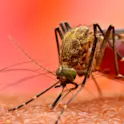
Health
09 Feb 2023
Human test subjects may no longer be needed for mosquito bite trials thanks to invention of new biomaterial
by Angharad Brewer Gillham, Frontiers science writer Image/Shutterstock.com Studies on mosquito feeding behavior are crucial to fighting malaria, dengue, and other mosquito-borne pathogens – but traditionally, they require humans or animals to act as meals for the mosquitoes. Scientists have developed a biomaterial which mimics skin, right down to blood under the surface, to make studies on mosquito feeding easier to run. Mosquitoes: the world’s deadliest animal. These tiny flying insects are vectors for dengue fever, yellow fever, Zika, malaria, and many other illnesses which affect millions of people around the world, with a significant morbidity and mortality burden. Because they spread disease when they bite people, understanding their feeding behavior is critical to reducing the harm they do. But how to study mosquito feeding behavior without giving them a live meal? A collaboration between Rice University and Tulane University in the US has developed a biomaterial which could eliminate the need for human volunteers or animal subjects in mosquito bite research. “Several groups are dedicated to finding ways to stop mosquitoes from biting, but bringing new repellents to market is challenging,” said Prof Omid Veiseh, Rice University, corresponding author of the study published in Frontiers in Bioengineering and Biotechnology. […]













